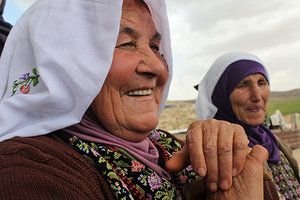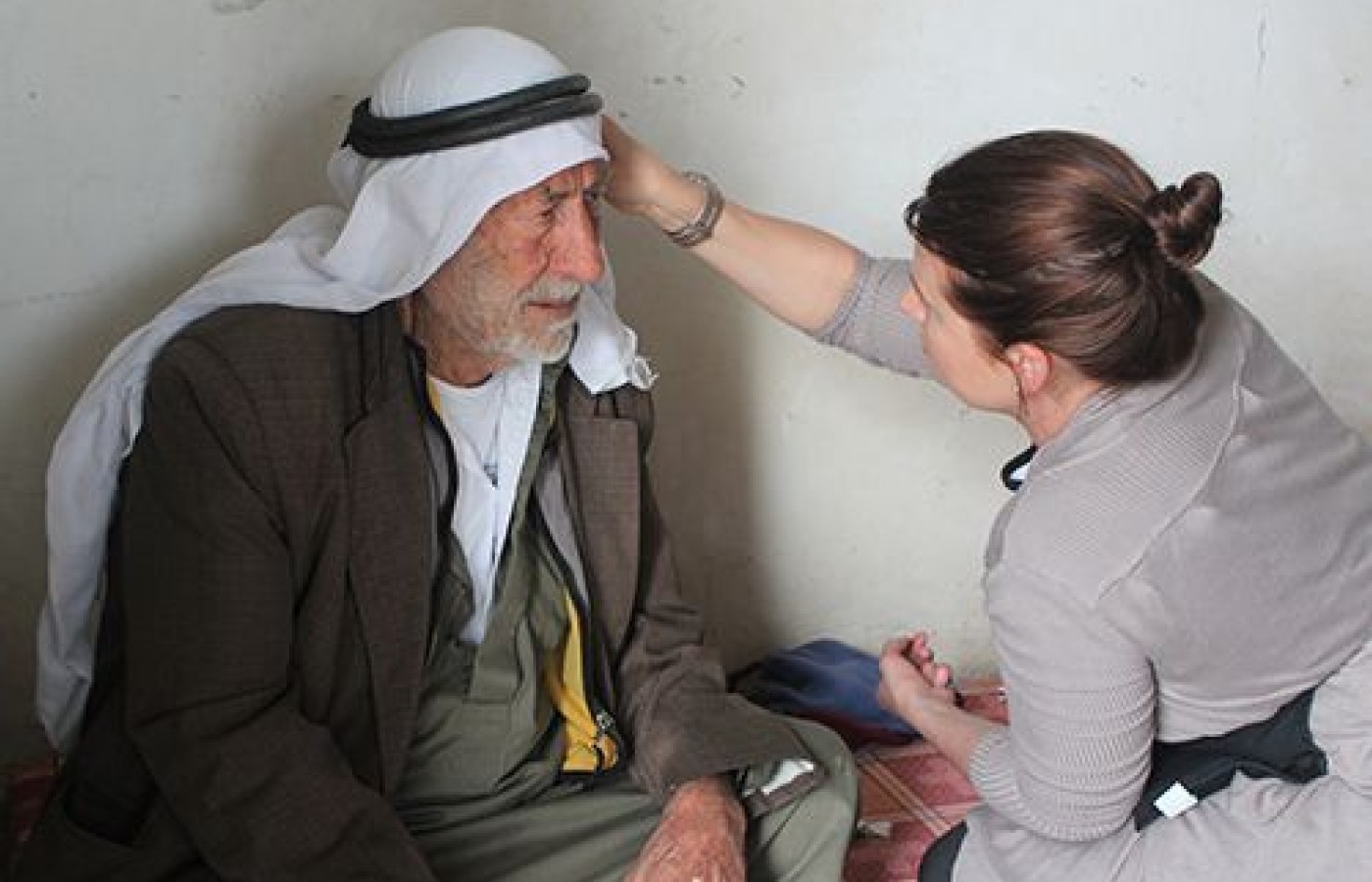The most important relationship I seek to nurture in the treatment room is the one a patient has with their own body. We live in a culture that teaches us to override pain, defer to outside authority, and push through discomfort. Patients often arrive hoping I can “fix” them, but the truth is, we can’t do the work for them. We can offer guidance, insight and support, but healing requires their full participation.
Conflict, Curiosity and Compassion: Healing a Divided World
In March 2017 Acupuncturists Without Borders (AWB) took 18 practitioners, it's mobile clinic, and its therapeutic "Peace Circle" on a World Healing Exchange tour to Israel and the West Bank. With hearts and minds full of curiosity and compassion, a bus-load of practitioners traversed Tel Aviv, the Negev Desert, the Dead Sea, the Christian, Jewish and Muslim sacred sites of Jerusalem, traditional herbal farms, a TCM Conference, a local hospital's TCM department, and several Palestinian and Bedouin villages.
We experienced in real time the pulsation of land whose very culture is conflict; palpably present on both sides of infamous and controversial border walls. We traveled through armed checkpoints where we were at times searched and interrogated. The young soldiers, about the age of my college-sophomore son, were strapped with large weapons and trifled through our bags and asked pointed questions.
Though the landscapes an cityscapes we tread through were breathtakingly beautiful, they were commonly demarcated by threads of barbed wire. The honey-gold vitality of the desert and rolling hills we traveled between on crude, bumpy single-lane roads to get to a Palestinian village one clear morning was betrayed by an ominous tension, and the sound of a military helicopter circling above our caravan.
At each of our destinations there were a few awkward moments of looking one another up and down; can we trust these people? Do they trust us? Are we safe? What makes us so different? Are they judging us? Are we judging them? Our ability to manage our own mind chatter and Qi disturbances was challenged daily, for sure.
Our own angst and discomfort as a group was unearthed and aired clumsily, in our practice of "Council" between destinations. Council is a process of interpersonal conflict resolution and effective communication that has its origins in Native American, Quaker and Buddhist traditions. Council employs active listening without interruption and speaking succinctly from the heart.

As healers who travel into areas of crisis and high tension, we are regularly and unavoidably impacted by the suffering we endeavor to alleviate. AWB maintains that individual and interpersonal healing practices such as acupuncture treatments, Qi Gong, and Council are essential for maintaining proper boundaries and staying well in the field.
An essential part of AWB's mission is to support healers in developing awareness and capacity to manage one's own triggers and Qi disturbances. Our team was led by an Israeli-Palestinian tour guide impressively well-versed in world history and religions. Under his care, we were safely and skillfully guided through armed checkpoints, villages, markets, temples, holy lands, history books and propaganda. I was impressed by his ability to impart stories through a prism that could reflect as many perspectives as there are people on the planet, as well as his active refusal to give up the dream of a peaceful existence.
We encountered many Israelis and Palestinians who are working together to transform conflict into cooperation. We were told everywhere we went that PTS (post traumatic stress) is an epidemic and part of the fabric of everyday life — having tenaciously infiltrated generations, families, communities and nations.
Getting Past the Conflict
Among the diverse cast of characters we met was a woman that is a main character in The Lemon Tree, the true story of a 35-year friendship between an Arab and an Israeli whose families shared the same home; an Israeli colleague who gives acupuncture treatments in a bomb a shelter along the Gaza strip; a Bedouin woman who gathers herbs in the desert, makes medicines and lotions by hand, employs and inspires the women in her village; artisans of all stripes who imagine, create and bring to market the soulful fascinations of their hearts.
We participated in a mobile clinic with Physicians for Human Rights in a Palestinian village with doctors and acupuncturists that regularly venture to "the other side" of the wall to provide care and friendship. We visited the Temple Mount, the Wailing Wall, the site of Christ's birth, and Yad Vashem (the Holocaust Museum). We visited herbal farms employing Israelis and Palestinians, entrenched in property battles, and targeted by the Boycott, Divest and Sanctions (BDS) movement.
We had tea and cake on a rooftop in Jerusalem with two men who live in diabolically opposed worlds, divided by walls and generations of conflict. They shared the stories of their personal tragedies perpetrated by "the other side," each having lost a child in violent incidents. They shared their story of friendship and reconciliation, and introduced us to Parent's Circle, the peace organization which they now both represent.

Without exception, our hosts and hostesses welcomed us with hospitality, traditional homemade dishes and tea, curiosity and lively conversation — if complicated at times by language barriers. Time and again we experienced face-to-face meetings — human proximity — where body language, smiles, gestures, warm eyes, hand shakes, hugs, and simple offerings of hospitality are capable of dissolving fears and ideological barriers.
Since being on this journey, I've been contemplating walls and checkpoints; how we consciously and unconsciously — figuratively and literally — build walls. Is it human nature, somehow, that we so skillfully and nonchalantly alienate ourselves from one another? I suppose it's not unlike the walls which we construct within ourselves to dissociate from our uncomfortable emotions; little bits of tension, crooked postural habits, aches and pains, full-on disease patterns. Coping strategies.
When we dissociate from ourselves, we cause self harm, often unconsciously, by eating food until we're numb, working until we collapse, drinking until we feel no pain, or using recreational drugs, sex, relationships — or whatever — to experience momentary relief; numbness. There is alienation between body and mind; spirit and matter. The community of cells, organs, tissues, fluids and vibrations within us becomes hampered in its capacity to regulate itself and inner pathology develops.
In our outer world we place physical and ideological barriers between "us" and "them." Religion, ideologies, border walls, cultures, economic circumstances, sex, physical and lifestyle differences are some of the many things we use to judge and dissociate ourselves from other humans. We build walls around our hearts and around our properties. We work in cubicles and use literal and proverbial walls to delineate who we are and what's mine and what's yours. Perfectly human nuances and potentially empowering institutions can be swiftly, if insidiously, deployed as weapons that decimate our capacity for genuine human connection and, ironically, compassion.
What You Gain by Giving
I noticed many times during our journey that when we left a room it was always with our hearts fuller than when we entered; smiles from the inside; eyes full of hope; yearning for more time together — deeper connection, more productive conversations. I wondered if our hosts and hostesses felt the same way? Could it be that in the heart of the world's suffering lies the impetus for the greatest healing? That this entire conflicted land could serve as a dynamic acupuncture point for the entire planet, sending a ripple of human healing potential into the cosmos?
It feels as if we've visited the orchestra pit from which a band of worldly healer/musicians are sending their unique and sophisticated sounds and sensations of love, understanding and compassion into the world through education, cultivation, hospitality, artistry, healing modalities and other diverse means. The invitation is for the world to be inspired and to join the orchestra, in whatever healing capacity each one of us instinctually and passionately embodies.
The potent beauty of what we bring as acupuncture practitioners — Qi doctors — I think, is the capacity to transcend words and stories; to gently touch and re-organize disease into fluidity beneath the surface, at the level of cellular consciousness. We know well that when isolated cells start communicating and collaborating, miraculous transformations are possible.
We can see in and among our patients that when one cell lights up, the one next to it already feels brighter, more alive. With a few intelligently placed needles, and the exhilarating experience of heartfelt connection between humans, we embark on a mission to ease and inspire internal worlds, outer auras and, through a ripple effect, entire communities.



